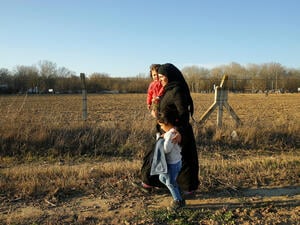Slovakia: New agreement on border and airport monitoring
Slovakia: New agreement on border and airport monitoring
UNHCR has signed an agreement with the Slovak Aliens and Border Police and the Bratislava-based Human Rights League for monitoring activities along Slovakia's land borders and at its airports. The main purpose of the monitoring, which will be carried out through regular missions funded by UNHCR, is to ensure that asylum seekers have access to EU territory and to asylum procedures.
The agreement, signed on 5 September, formalizes the cooperation, roles and responsibilities as well as the working methodologies of the parties involved.
A similar agreement was signed with Hungary in late 2006 and negotiations are currently under way with Slovenia and Poland for a similar arrangement which we hope will be finalised during the upcoming months. These arrangements represent an important element of UNHCR's activities under the recently announced 10 Point Plan of Action for Eastern and South Eastern borders of EU.
The countries which make up the EU's eastern frontier - Poland, Slovakia, Hungary and Slovenia - face significant irregular migration, often facilitated by smuggling and trafficking networks. While the region has traditionally served as a point of transit, certain countries are increasingly becoming destination countries for both migrants and asylum seekers. Monitoring of the eastern EU border, stretching over 2,610 kilometres, is one of the core activities of UNHCR in the region.
In 2006, a total of 9,900 new asylum seekers were registered in Hungary, Poland, Slovakia and Slovenia, compared with 14,600 in 2005 and 22,100 in 2004.
With the mix of migrants and asylum seekers, as well as the criminal elements involved in the profitable human-smuggling racket, law enforcement bodies tend to focus on stopping illegal migration rather than assisting asylum seekers. The new agreements, as well as those in preparation, are designed to ensure that asylum seekers receive the help and protection they are entitled to under international law.









